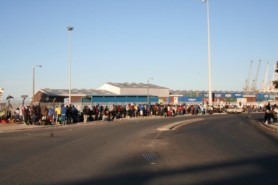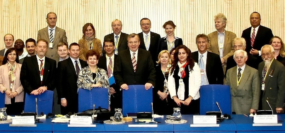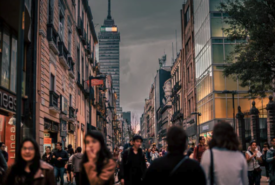Posted on 20 Mar 2014
Peter Gastrow, one of the Global Initiative’s founding members, is a seasoned lawyer, parliamentarian and expert on peace-building and combatting organized crime in South Africa and beyond.
A “jack of all trades” is how Peter Gastrow describes himself. Indeed, as a prosecutor, advocate, parliamentarian, peace broker, advisor to the police minister and policy analyst on organized crime, he has made many contributions to South Africa. Gastrow played an important role as peace broker during the country’s fraught transition to democracy. Thereafter, he has worked to address some of the post-apartheid challenges around policing, crime and organized crime.
Gastrow, who now works as an international consultant on issues relating to TOC, governance and conflict, practiced as an advocate in Durban before leaving to join Parliament to represent the Progressive Federal Party (which later evolved into the Democratic Alliance) in 1981. He served in this position until the first democratic elections in 1994, and during the 1980s and early 1990s played a key role in helping to tackle the political violence in KwaZulu Natal that had escalated between rival organizations jockeying for power. “That part of South Africa had become known as the country’s “killing fields” with more that 1000 politically related deaths during the six months before the 1994 election alone,” recalls Gastrow.
In 1985 he initiated and took part in the first meeting between the PFP and the then exiled African National Congress leadership in Lusaka, Zambia, to explore the potential of a negotiated settlement for South Africa. He also participated in the historic talks with the ANC leadership in Dakar, Senegal, led by then PFP leader Dr van Zyl Slabbert.
Gastrow was involved in setting up and serving on the National Peace Accord in 1991, which was an attempt to halt political violence in the country and what had become an all-out war between the ANC and the Inkatha Freedom Party in KwaZulu Natal and the townships around Johannesburg, threatening to scupper the country’s first democratic elections. Gastrow wrote a book about this experience, Bargaining for Peace: South Africa and the National Peace Accord. He also took part in CODESA, the constitutional talks that led to the creation of a new, democratic constitution for the country. After the 1994 elections, Gastrow worked as a special adviser to the Minister for Safety and Security, with the aim of helping transform the police force. His focus then moved to organized crime in Southern Africa when he joined the Institute for Security Studies, serving as its Cape Town director from 1998 – 2009 and working closely on various projects with UNODC.
Gastrow is married to Shelagh, another prominent South African: she is currently the director of a civil society non-profit and is well-known for the popular “Who’s Who of South African Politics” publication that she authored for several years. The Gastrows have three children, one grandchild (and another on the way) and live in Cape Town. For relaxation, Gastrow loves hiking on nearby Table Mountain. His multi-faceted career has seen many highlights but the one at the forefront of his mind is the launch of the Global Initiative in New York last year, which he says, “brought together so much of the work that I’ve been involved with over the past 15 years”.
1. South Africa has long been dogged by high crime rates. What is your perception of how things are right now?
In a few key areas – like murder – crime rates are definitely down. This is largely attributable to the dissipation of the
political instability of the 1980s and 1990s. It’s a welcome improvement, but South Africa still has one of the highest
crime rates in the world.
2. How big a problem is organized crime for South Africa and to what extent does it fuel the high crime rate?
There is no doubt that the impact of organized crime in South Africa is growing. There are ongoing media reports of significant seizures of drugs at airports and roadblocks. Environmental crime, particularly the trafficking of rhino horn, is huge. Just last year, more than 1 000 rhinos were reportedly poached. With regard to cybercrime, it’s now being reported that South Africa is the third-hardest hit country, after Russia and China. Last year, one million people fell victim to cybercriminals.
Organized crime certainly has an impact on crime rates in South Africa but it can’t be regarded as the main driver of crime. There are far more fundamental issues that perpetuate crime such as the massive discrepancy between rich and poor and millions of unemployed people; South Africa’s violent history; and the social dislocation that has resulted from urbanization.
3. Could South Africa become a major conduit for TOC as has occurred with other countries on the continent?
Like some West African countries, South Africa is likely to become an increasingly popular transit hub for drugs from both Latin America and the East, and this will have a bearing on the drug consumption levels of the local population. But with its relatively sophisticated infrastructure, as well as its well-developed policing and justice institutions, the country is not in the same category as others like Guinea Bissau, for example. However, it remains a challenge for the authorities when there is an avalanche of contraband moving through airports, harbors and other transit zones. South Africa has advantages for contraband traffickers that some other African countries don’t: it has multiple transatlantic flights every day, first class harbors, banking services, and communications networks, and access to high living standards.
4. You helped negotiate peace during the turbulent political conflict between the IFP and ANC that preceded democracy. What were some pertinent lessons you learned that could have a bearing on other peacekeeping efforts in conflict ridden countries undergoing political transition around the world?
Most of the lessons I picked up along the way are specific to South Africa, but one lesson is applicable anywhere: as a prerequisite for effective involvement in conflict areas, cultivating a deep knowledge of every aspect of the affected communities, including the culture, history, language, tradition and leadership figures is critical. Unless you have this ‘feeling between your fingers’ of what an area is all about, it’s just not possible to build up trust, and this can lead to a backlash. People don’t pay enough attention to this because it seems so self-evident.
5. Peacekeepers are being asked to help combat organized crime, given that it is one of the biggest destabilizing factors in conflict-ridden and fragile states. What is your view of this?
I agree with this approach but what must be avoided is a ‘bull in a china shop” approach where there is insufficient
understanding of the criminal groups involved, and how they fit into the political and social environment.
6. In which parts of Africa do you think organized crime is most entrenched and poses the greatest danger to the rest of the continent?
Organized crime thrives most where institutions are weak, corruption is high and systems of government have collapsed. We’ve seen this in Guinea Bissau, Mali, Somalia, and several southern African states, including Mozambique. There is a danger when wealthy global crime operators move in with more money than the local people have – even the elites. Look at the case of Jackie Selebi (former SA police chief and Interpol president convicted of corruption in 2010). Every developing country ought to regard itself as a target of organized crime. Perpetrators are intent on hollowing out government institutions so that they can operate under the protection of those with power and with a low risk of detection. Developed countries are in less vulnerable position. Transnational organized crime is rife but they have more of a grip on it.
7. What other aspects of TOC pose the biggest threat to the world, in your view?
When it comes to ordinary crime there is usually a victim. This leads people to get upset and push for better policing or to vote out governments. But with organized crime, ordinary citizens don’t think they’re affected. The killing of 1000 rhinos last year, or the ongoing decimation of forests as a result of illegal logging, doesn’t have an immediate effect on people. But the consequences for society as a whole are massive. The challenge is to bring home to the world how crucial it is to act against organized crime. Cybercrime is coming like an avalanche globally and we are not equipped to handle it.
What can the GI do about the problem?
The added value that the GI can bring is that it is a global, non-aligned forum, backed up by a network of experts from every corner of the world. Policy issues relating to organized crime can be discussed in creative and innovative ways without being hemmed in by institutional parameters. We are not entering the fray with political baggage. Experts take part in their personal capacity in open and creative discussion. We hope to develop new approaches that governments and institutions might be willing to consider and to implement, taking into account of course the limitations under which they operate.



